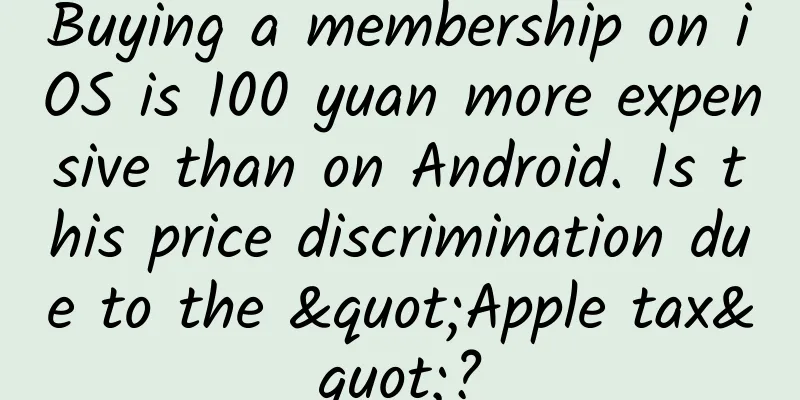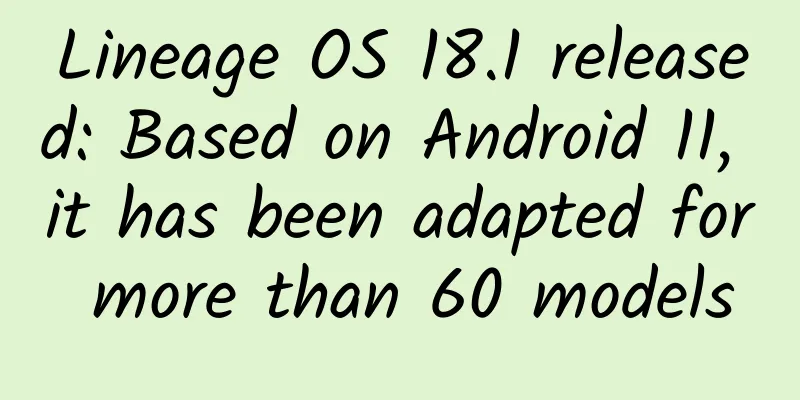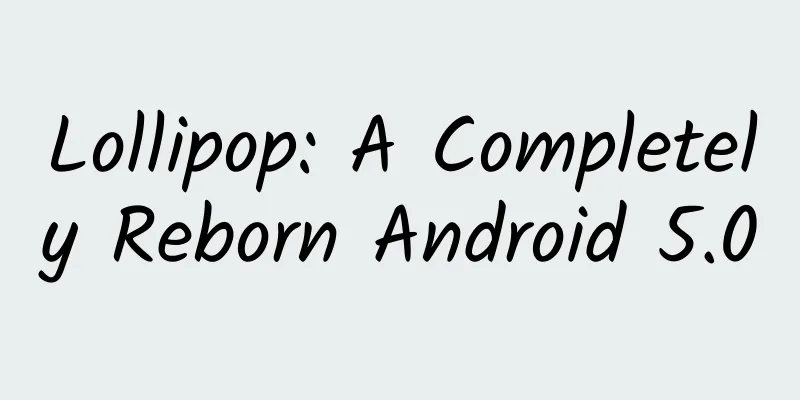Buying a membership on iOS is 100 yuan more expensive than on Android. Is this price discrimination due to the "Apple tax"?

|
After decades of user education, it is not difficult for Internet companies to get money from users. Video, music, cloud storage, and even beauty cameras all have a considerable number of paying members. However, some users recently found that the membership fees of some apps are displayed at different prices on Apple and Android phones, and they suspect "double pricing". A netizen posted a question on Zhihu titled "Baidu Netdisk has double prices, what do you think?" The netizen said that the price of Baidu Netdisk membership purchased on Android was significantly different from that purchased on iOS, and the price difference for annual membership was nearly 100 yuan. Interface News reporters compared the prices of Baidu Netdisk memberships on three terminals: Apple phones, Android phones, and computer web pages, and found that there are indeed large differences. Top: iOS, Android; Bottom: Web Taking the highest-priced annual membership as an example, the price of Baidu Netdisk Super Membership on iOS is 328 yuan; on Android phones, the price is 263 yuan, and after adding the mid-year special coupon, the payment price is 200 yuan; on the web, after using the same coupon, the price is 250 yuan. The difference between the highest and lowest prices on the three platforms is 128 yuan. Similar situations not only occur on Baidu Netdisk, but also on video apps where members are very enthusiastic about paying. Jiemian News reporters checked the three major video apps, iQiyi, Youku and Tencent Video, and found that the prices of the three apps on Apple and Android terminals are different. Among them, iQiyi has the highest price difference. Regardless of the subscription method, the price on iOS is more than 20% higher than that on Android. Tencent Video has a smaller price difference. The initial subscription price is the same, but the renewal price on iOS is higher than that on Android. iQiyi VIP, left: iOS; right: Android Youku VIP, left: iOS; right: Android Tencent Video VIP, left: iOS; right: Android Many users believe that it is the same service, but different sales prices are applied to different mobile phone operating systems, which constitutes price discrimination.As for the reason for the different prices, the app developers do not specify it on the purchase page, and even the membership agreement only vaguely states it. According to the Baidu Netdisk Member Service Agreement, "Baidu may modify and change the relevant rights and interests rules, charging standards, methods, etc. of this service based on the overall planning of this service. Baidu will update and display the above modifications and changes on the corresponding service page." The reason for all this can be traced back to the "Apple tax". In-app purchases or memberships of iOS apps provided by the App Store must be purchased using the iTunes payment system, and Apple will charge 15%-30% of the transaction fee, which is the so-called "Apple tax." However, Apple only charges commissions to virtual service providers, and does not charge commissions to apps that provide physical goods or services, such as Taobao, Ctrip, Didi and other software. In other words, for every membership product a user buys on the iPhone, Apple will take 30% of the fee, and the merchant will only take 70%. As a result, some businesses put this part of the "loss" on the users and raised the price of services on the iOS platform to balance the profits of different platforms. It should be noted that Apple does not restrict the price of App services, and developers can set their own prices. From this perspective, the price discrimination of App members is not entirely Apple’s fault, but because app developers pass the cost of the “Apple tax” on to users. On Android phones, there is no problem of app stores taking a cut from in-app purchases. Android app stores only take a cut from paid apps, and in-app purchases are mainly completed through third-party payment platforms such as WeChat/Alipay, and app stores do not participate in transactions. According to data released by Apple, App Store revenue in 2019 was $519 billion, of which sales in China were $246 billion (about 1.74 trillion yuan), accounting for 47% of the total, ranking first in contribution. 519 billion yuan, this amount would require Apple to sell iPhones for three years (according to sales data from 2018-2019) to reach. The huge profits and Apple's dominance have caused dissatisfaction among many developers. The 30% Apple tax has caused many lawsuits, and the plaintiffs all believe that this is a monopoly behavior. For example, the music streaming service Spotify has been fighting against Apple since 2015, but the European Commission has not yet made a ruling on Spotify's complaint. Just recently, several companies have complained about Apple's App Store, including Kobo, an e-book reader subsidiary of Japan's Rakuten, and the American company Basecamp, and Apple is facing an antitrust investigation by the European Commission. Apple explained in 2019: the operating expenses of the App Store itself are huge, and there are a large number of free apps in the App Store that cannot bring Apple the opportunity to share profits, which offsets the developer's revenue share. A product manager engaged in App development recalled to Jiemian News that many Apps tried to bypass Apple Pay in the early years. "For example, they created a webpage for payment and let users scan the code to pay directly without going through the platform. But if the volume is large, such webpages may be banned, or if Apple finds out, they will refuse to put it on the shelves." The above-mentioned product manager believes that the App Store is safe and standardized for consumers, while the Android app market is relatively chaotic and prone to virus infection. However, developers have to pay an annual fee to Apple, and a 30% commission seems too much: "You need to register a developer account to list an app, and the account will be paid annually, which is $99 and $299 respectively. I think it is okay to give this money to Apple as maintenance and review fees, but I personally think it is okay to charge commissions for paid software, but 30% is a bit too much." Let’s go back to the original question. What should I do if the price is higher when purchasing App memberships such as Baidu Netdisk with an Apple phone? Many people choose to violate regulations and buy extremely low-priced "pirated memberships" online. A Baidu Netdisk member user said, "You can buy one for a few dollars on Xianyu." Another simple and legal method is to use a friend's Android phone to buy a membership. Currently, most apps support multi-platform use, so Apple users can purchase membership services for themselves on the web or on someone else's Android phone and synchronize them to their own devices. |
<<: Android 11 new features: new power, new notification center, better user experience
>>: WeChat “Tap”: the greatest common denominator of socializing with acquaintances and strangers
Recommend
Wearing reading glasses, with gray hair... at the age of 55, he set foot on space three times: I want to work in aerospace all my life, it’s worth it!
Two manned missions He also served as the command...
How to master information flow video promotion?
Currently, the trend of online video advertising ...
How to deal with brand crisis public relations? Here’s a guide for you!
This year is definitely the year of public relati...
New energy vehicles have received subsidies of 19 billion yuan in the past two years, with Yutong, BYD and JAC being the top beneficiaries
Recently, the Ministry of Industry and Informatio...
Brightness is 50 times higher than the previous record. Chinese satellite accurately measures the brightest gamma-ray burst to date
Science and Technology Daily reporter Lu Chengkua...
Alipay password red envelope: common scenarios and gameplay summary
Passwords are not as simple as they seem. I will ...
Daimler plans to invest 10 billion euros in electric vehicles and launch more than 10 models
According to Nikkei Chinese website, on February ...
Whether you choose Android or iOS, you may encounter Microsoft apps
[[127658]] Since launching its cross-platform str...
Misconception! 5 common misunderstandings about information flow advertising image materials, with 4 guidelines + 2 cases attached!
Introduction: This article lists five major color...
Google Play's return to China is highly anticipated: it is expected to reshape the Chinese mobile game market
According to the technology blog VentureBeat, Chi...
Are the water chestnuts you eat 20 cents, 40 cents or 0 cents?
People in the south of the Yangtze River are prob...
AR glasses want to completely break up with iPhone! Apple: I can't do that
While it’s easy to overstate the state of AR as a...
How to write code that others can understand
With the continuous development of the software i...
[2014 WOT Shenzhen Station Lecturer Interview] Tencent Zhang Dan: Mobile games will be further segmented
From November 21 to 22, 2014, the 2014 WOT Global...
Jiang Shuying asked what Aquaman was, so what did Aquaman mean? Do you know Aquaman?
The TV series "Nothing But Thirty" star...









